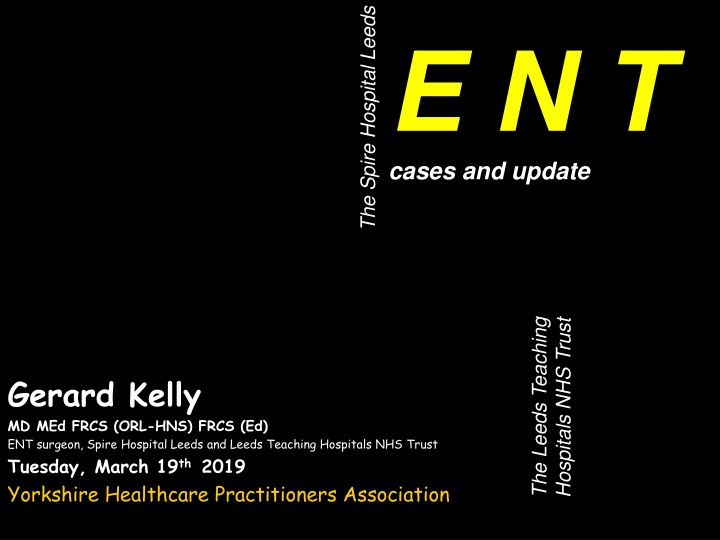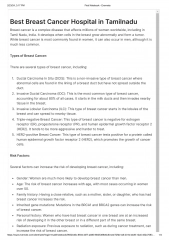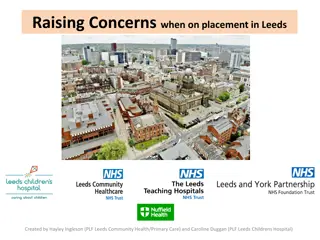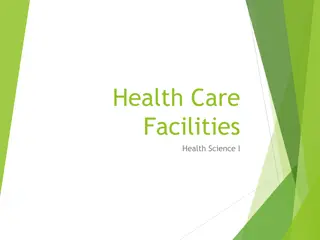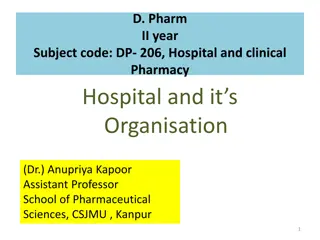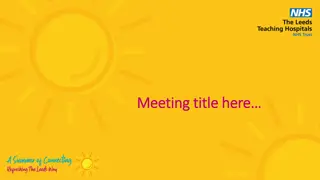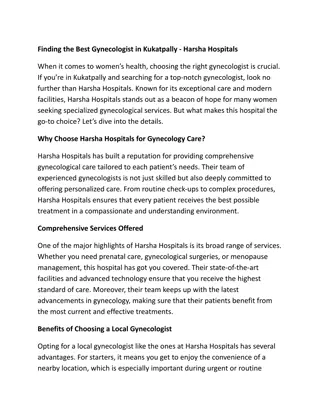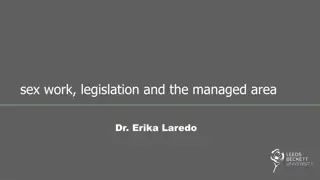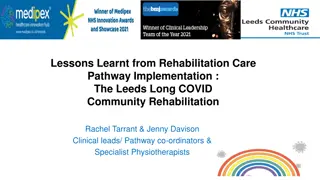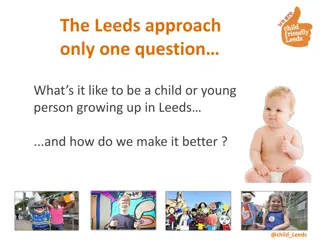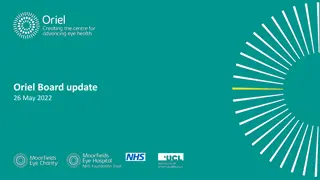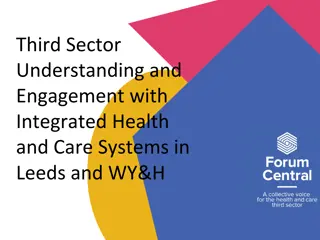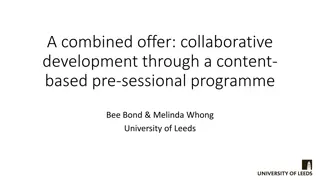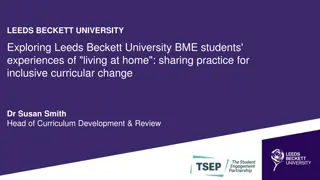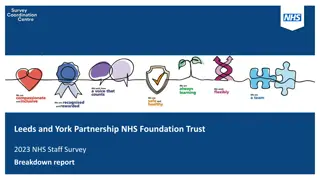Comprehensive Overview of E.N.T. Cases and Updates at Leeds Teaching Hospitals
Explore a detailed overview of E.N.T. cases and updates at Spire Hospital Leeds and Leeds Teaching Hospitals NHS Trust by ENT surgeon Gerard Kelly, including symptoms and diagnostic factors for vertigo. Learn about essential examinations, history-taking, and sensations in patients with vertigo.
Uploaded on Oct 06, 2024 | 0 Views
Download Presentation

Please find below an Image/Link to download the presentation.
The content on the website is provided AS IS for your information and personal use only. It may not be sold, licensed, or shared on other websites without obtaining consent from the author.If you encounter any issues during the download, it is possible that the publisher has removed the file from their server.
You are allowed to download the files provided on this website for personal or commercial use, subject to the condition that they are used lawfully. All files are the property of their respective owners.
The content on the website is provided AS IS for your information and personal use only. It may not be sold, licensed, or shared on other websites without obtaining consent from the author.
E N D
Presentation Transcript
The Spire Hospital Leeds E N T cases and update The Leeds Teaching Hospitals NHS Trust Gerard Kelly MD MEd FRCS (ORL-HNS) FRCS (Ed) ENT surgeon, Spire Hospital Leeds and Leeds Teaching Hospitals NHS Trust Tuesday, March 19th 2019 Yorkshire Healthcare Practitioners Association
Ear 6 symptoms otorrhoea otalgia itch hearing tinnitus balance
Nose 6 symptoms nasal obstruction rhinorrhoea facial pain smell epistaxis post nasal drip
Throat 6 symptoms dysphagia dysphonia odynophagia pain neck lumps weight loss
vertigo is the hallucination of movement it is usually but not always rotatory The Leeds Teaching Hospitals NHS Trust 6
what is the most important factor in diagnosis in a patient with vertigo? The Leeds Teaching Hospitals NHS Trust 7
examination of the tympanic membranes audiogram stapedial reflexes BSERA unterberger s calorics ENG cranial nerve examination MR head CT scan The Leeds Teaching Hospitals NHS Trust 8
history The Leeds Teaching Hospitals NHS Trust 9
what do you want to get out of the history? The Leeds Teaching Hospitals NHS Trust 10
what the sensation is like? movement? drunk? light headed? The Leeds Teaching Hospitals NHS Trust 11
how long does it last? seconds? minutes? hours? any warning that it is going to happen? The Leeds Teaching Hospitals NHS Trust 12
any exacerbating or reliving factors? staying still? medication? standing up quickly? The Leeds Teaching Hospitals NHS Trust 13
any associated features? tinnitus? hearing? tingling in the arms and hands? The Leeds Teaching Hospitals NHS Trust 14
Vertigo summary
vertigo Benign paroxysmal positional vertigo (BPPV). Intense, brief vertigo immediately with a change in head position, turning over in bed, sitting up in morning, or bending down. Common. Can follow vestibular neuronitis. Vestibular neuronitis / labyrinthitis. Sudden intense, constant vertigo, days. Nausea, vomiting. Bedbound. Hearing loss = labyrinthitis. Generally subsides on its own. Vestibular rehabilitation = speeds recovery. Meniere's disease. Build up of fluid in the inner ear. Sudden episodes of vertigo lasting as long as several hours, accompanied by fluctuating hearing loss, ringing in the ear and a feeling of fullness in the affected ear. Vestibular migraine.More than a headache. Visual "aura and vertigo episodes without a severe headache. Such vertigo episodes can last hours to days and may be associated with headache as well as light and noise sensitivity. Acoustic neuroma. (vestibular schwannoma) benign growth on the vestibular nerve. Symptoms of an acoustic neuroma generally include progressive hearing loss and tinnitus on one side accompanied by dizziness or imbalance. Other causes. Rarely, vertigo can be a symptom of a more serious neurological problem such as a stroke, brain haemorrhage or multiple sclerosis = other neurological symptoms.
41 year old male right otorrhoea 6 weeks itch foul smelling reduced hearing treated with several courses of gentisone
Otitis externa - fungal itch otorrhoea previous or recurrent symptoms
Otitis externa treatment?
Otitis externa treatment? nothing medical aural toilet
ear infection emergencies
3 year old male distressed 2 day post URTI temperature 39.2 C pulling left ear
acute otitis media treatment?
antibiotic use for acute otitis media varies from 31% in the Netherlands to 98% in the USA and Australia
Antibiotics slightly reduce the number of children with acute middle ear infection experiencing pain after a few days.
Antibiotics slightly reduce the number of children with acute middle ear infection experiencing pain after a few days. However, most (78%) settle spontaneously in this time, meaning 16 children must be treated to prevent one suffering ear pain.
Antibiotics slightly reduce the number of children with acute middle ear infection experiencing pain after a few days. However, most (78%) settle spontaneously in this time, meaning 16 children must be treated to prevent one suffering ear pain. This benefit must be weighed against the possible harms: 1 in 24 children experience symptoms caused by antibiotics.
Antibiotics slightly reduce the number of children with acute middle ear infection experiencing pain after a few days. However, most (78%) settle spontaneously in this time, meaning 16 children must be treated to prevent one suffering ear pain. This benefit must be weighed against the possible harms: 1 in 24 children experience symptoms caused by antibiotics. Antibiotics are most useful in children under two years of age, with bilateral AOM, and with both AOM and discharging ears.
Antibiotics slightly reduce the number of children with acute middle ear infection experiencing pain after a few days. However, most (78%) settle spontaneously in this time, meaning 16 children must be treated to prevent one suffering ear pain. This benefit must be weighed against the possible harms: 1 in 24 children experience symptoms caused by antibiotics. Antibiotics are most useful in children under two years of age, with bilateral AOM, and with both AOM and discharging ears. For most other children with mild disease, an expectant observational approach seems justified. We have no data on populations with higher risks of complications.
we overuse antibiotic in acute otitis media a trial of withholding antibiotics is usually effective either because it works or because with time and aging there is natural resolution
sudden hearing loss emergencies
64 year old woman presents 2 day history of hearing loss in the right ear
64 year old woman presents 2 day history of hearing loss in the right ear what do you ask?
sudden sensorineural loss definition at least 30dB hearing loss over 3 contiguous frequencies a period of a few hours to 3 days
sudden sensorineural loss incidence 5 20 per 100 000 people per year 1 in 10 000 people per year 0.01% people per year
sudden sensorineural loss typical patient 40 50 years M=F 30% have balance symptoms
sudden sensorineural loss aetiology?
sudden sensorineural loss Infection Bacterial postmeningitis, bacterial labyrinthitis, syphilis Viral mumps, cytomegalovirus Inflammation Autoimmune Cogan s syndrome, systemic lupus erythematosus Multiple sclerosis Trauma Temporal bone fracture Acoustic trauma Perilymph fistula Tumor CPA tumour Temporal bone metastasis Carcinomatosis meningitis Toxins Aminoglycosides Aspirin Vascular Thromboembolism Macroglobulinemia, sickle cell disease, post-CABG, vasculitides
sudden sensorineural loss Infection Bacterial postmeningitis, bacterial labyrinthitis, syphilis Viral mumps, cytomegalovirus Inflammation Autoimmune Cogan s syndrome, systemic lupus erythematosus Multiple sclerosis Trauma Temporal bone fracture Acoustic trauma Perilymph fistula Tumor CPA tumour Temporal bone metastasis Carcinomatosis meningitis Toxins Aminoglycosides Aspirin Vascular Thromboembolism Macroglobulinemia, sickle cell disease, post-CABG, vasculitides
sudden sensorineural loss Infection Bacterial postmeningitis, bacterial labyrinthitis, syphilis Viral mumps, cytomegalovirus Inflammation Autoimmune Cogan s syndrome, systemic lupus erythematosus Multiple sclerosis Trauma Temporal bone fracture Acoustic trauma Perilymph fistula Tumor CPA tumour Temporal bone metastasis Carcinomatosis meningitis Toxins Aminoglycosides Aspirin Vascular Thromboembolism Macroglobulinemia, sickle cell disease, post-CABG, vasculitides
stroke and SSNHL Stroke. 2008 Oct;39(10):2744-8. Epub 2008 Jun 26. Sudden sensorineural hearing loss increases the risk of stroke: a 5-year follow-up study. Lin HC, Chao PZ and Lee HC CONCLUSIONS: Our findings suggest that SSNHL can be an early warning sign of impending stroke. We suggest that SSNHL patients should undergo a comprehensive hematologic and neurological examination to help clinicians identify those potentially at risk for stroke developing in the near future.
steroids Wilson et al. The efficacy of steroids in the treatment of idiopathic SSNHL. Arch Otolaryngology 1980
steroids Wilson et al. The efficacy of steroids in the treatment of idiopathic SSNHL. Arch Otolaryngology 1980
